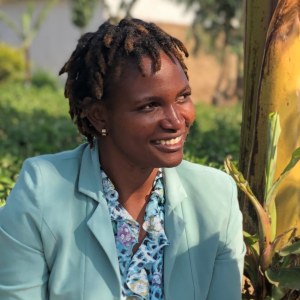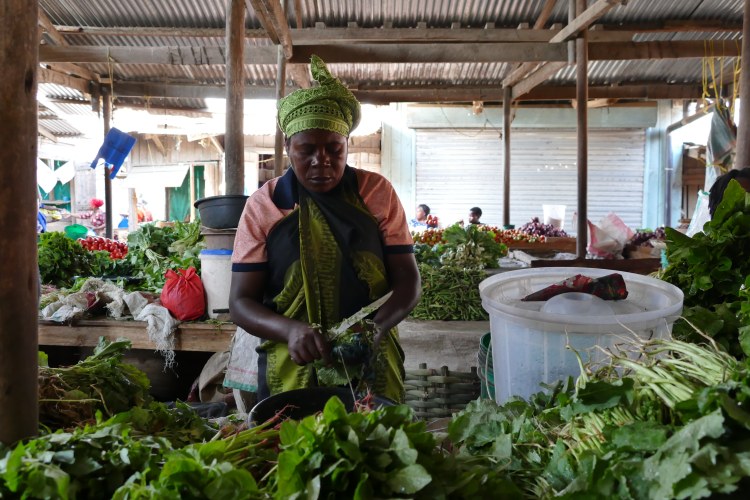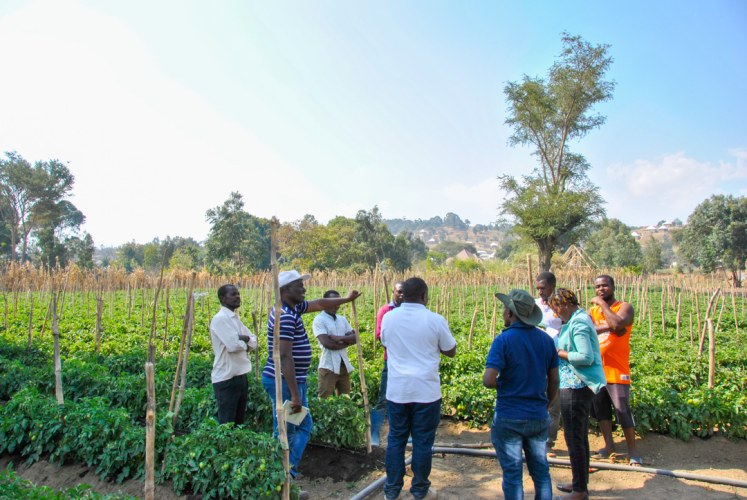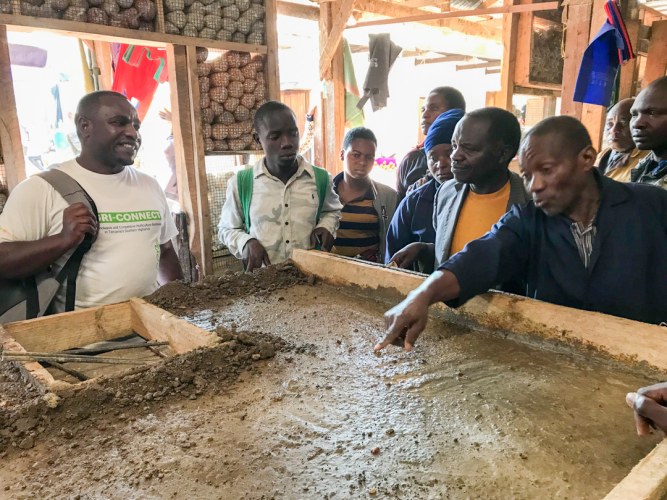Good food for the Green City in Tanzania
Good food for the Green City in Tanzania
Transforming Mbeya's urban food environment to ensure healthy food is accessible for all
"The Mbeya Food Smart City Platform is coming at the right time: we see that actors in the horticulture value chain are ready for change and want a safe supply of food in the city."

Being the biggest urban centre of the Southern Highlands, Mbeya is among the five biggest cities of Tanzania. It is well-known for its mountainous green landscapes and prolific urban farming, earning it the nickname ‘The Green City’. Embedded in the East African Rift System, the rich geological composition and favourable climate make Mbeya and its surroundings a fertile agricultural landscape. The Southern Highlands is a so-called breadbasket, net exporting rice, fruit and vegetables to nearby regions and countries. Remarkably, this abundance does not reach the plates of the 500,000 Mbeya citizens: malnutrition rates are higher than the country’s average and available produce in markets often has dubious quality. How comes the Green City, where food can grow in every garden, fails to provide good food for its citizens?
Challenges, About the Mbeya Food Smart City Platform
Rapid urbanisation: with a population of over 500,000 inhabitants, doubled since the census of 2012 and projected to double again by 2030, Mbeya is expanding fast, putting pressure on the existing urban infrastructure; dwellers end up in ill-serviced areas and with little sanitation infrastructure, complicating access to fresh food supply.
Poor food safety practices: the unsafety of food sold in local markets and consumed by the people of Mbeya is a major health concern. Food risk assessment shows high biological and chemical contamination levels in fruit and vegetables for sale (up to 100% of samples of papaya, green pepper and onions showed significant contamination with E. Colli, Staphylococcus Aureus and heavy metals, with other vegetables only scoring slightly lower levels). For products intended for export, farmers are often required to go through a certification process showing they adhere to “Good Agricultural Practices” (GAP) but there is no such code of conduct for farmers who only produce for the domestic market. Small-scale farmers often struggle to access good quality inputs, equipment and knowledge to safeguard the quality of their products.

Limited logistical framework: the road from field to plate is long and winding in Southern Highlands. With road infrastructure under traffic pressure, complex legislation and changing political climates, few private companies successfully venture into professional distribution and aggregation of produce on a larger scale. Most fruit and vegetables reach the local markets through a network of intermediaries, small-scale transporters and motor taxis that is largely uncoordinated. This leads to high post-harvest losses, minimal shelf life of perishables and poor traceability, complicating quality (and safety) control.
Political dynamics & lack of food governance: food is a responsibility shared, or divided, by many different city departments. Policies and interventions are difficult to coordinate to address all components of the food system, even more so in a city administration that is stretched to tackle many urban challenges at once. Sudden changes in political power impact heavily on regulations and /strategic approaches, rendering small-scale actors vulnerable to the consequences of market shocks etc.
Exclusion of vulnerable groups from the agriculture sector: Women, youth and other minority population groups are seen as people who are not contributing to the fast-growing agriculture sector. Their labour is disregarded thus they are not given the chance to engage in any profitable agricultural activity, which renders them vulnerable to exploitation, to poverty and to exclusion from decision-making processes. There is a need of bringing back these groups to recognise their work and their voices. In this way, they can improve their living standards in a more inclusive environment that benefits the entire sector.
Rikolto and TCCIA (Tanzania Chamber of Commerce, Industry and Agriculture) have joined forces with Mbeya City Council to transform urban food environments in Mbeya to ensure healthy and sustainable nutritious food for all. Together they launched the Mbeya Food Smart City Platform in 2020, engaging stakeholders from government authorities, private sector, civil society and educational institutions.










The platform identified six main objectives to improve food safety, decent livelihoods for food actors, especially vulnerable groups, food accessibility and (awareness on) nutritious diets:
Improve the sustainable consumption of vegetables and fruit to improve the health of citizens of Mbeya.
Promote and maximise the capacity to produce safe vegetables and fruit.
Increase opportunities in highly nutritious agriculture and support economic growth by creating new markets and supporting a competitive agriculture system.
Address community food needs by expanding existing community-based programmes and developing innovative programming to reach identified populations and high needs areas.
Improve and strengthen fair access to appropriate food with high nutritional value (fruit and vegetables) including social services.
Mobilise resources toward health and financial sustainability of the platform.
“I am glad to see at least some farmers and traders are beginning to understand about "food safety". Awareness in the markets and for farmers is beginning to appear in practice. The difficult issue is how to ensure that this knowledge reaches the majority, and it is also sustainable. The Mbeya Food Smart City platform is the answer to the development of all this. Let's all work together to make sure we get healthy and safe food.”

The main strategies to achieve these objectives are:
- Improve safety and quality of fresh fruit and vegetables supplied and consumed in Mbeya and its environments. We support farmers to improve the safety and quality of fresh fruits and vegetables supplied to Mbeya and its environments, by setting up the Mbeya Participatory Food Safety System, a participatory certification system in which farmers and vendors jointly monitor food safety.

Develop an integrated food governance. Here we facilitate urban food governance process to promote inclusive local food chains, upscale interventions and empower local voices in national discussions. In Mbeya we work closely with our partners TCCIA in achieving this.
Implement and support inclusive business models for a sustainable, fair and safe vegetables and fruit supply chain to Mbeya City. We look at the model that is fair and transparent between actors in the food chain, driven by a common goal and leading to a stable market and a constant supply of quality food in Mbeya City.
Improve Food Market infrastructures. We facilitate the improving of infrastructures especially in local markets where a lot of people visit to buy their daily necessities.

Increased consumption of high nutritious diets through women and youth participation in sustainable food systems. Here we create awareness through different communication platforms of how people can access but also why they should consume healthy diets. This is mostly done by spreading nutritious messages through different radio and sending the push messages to the people around Mbeya City to change their consuming behaviour.
City to city learning and exchanges, promoting the exchange of experience and good practices with other cities in Tanzania on food governance, innovative business models, and technology. Here Rikolto facilitate the learning exchange between cities whereby people from one city travel to another to learn various things like how to arrange food in the market and diverse ways of transporting food.
Expected results by 2024
The project expects to:
Reach 5,000 smallholder farmers in Mbeya
1250 farmers in each town council
Reach 50,000 consumers about the importance of high nutritious diets
And by the end of the project, four main results should be achieved:
Smallholder fruit and vegetable farmers have increased access to sustainable business development services, such as finance.
The profit margins for members of the farmer organisations and other value chain actors are increased through improved trading relationships and efficiency within the horticulture value chain.
Governance and coordination mechanisms within the fruit and vegetable sector are improved through strengthened horticulture platforms and member-based organisations.
The consumption of high nutritious diets has increased in the five southern regions through women and youth participation in sustainable nutritional sensitive horticulture value chains.
Our biggest achievements so far
After the launch of the Mbeya Food Smart City Platform in 2020 under the EU Agri-connect funded Building Inclusive and Competitive Horticulture Businesses in Tanzania’s Southern Highlands (BICHOBS) project, Rikolto, TCCIA and Mbeya City Council have seen a lot of achievement over few years.
In April 2021, the steering committee and governance structure of Mbeya Food Smart City platform was established in uniform decision among participating stakeholders. The multi-stakeholder platform has three subcommittees: Hygiene & Safety, Production, Processing & Business, and Infrastructure. Each subcommittee is organising their operations to contribute to safer and affordable food environments for Mbeya citizens.
In 2021 a communication campaign was launched to sensitise consumers in Mbeya City on food safety risks and advantages of safe food and healthy nutrition. T-shirts with food safety messages were distributed, 6 of the biggest public markets received a PA system to broadcast messages on hygienic practices in the market environment and 6 radio programmes about food safety issues were aired which reached an audience of 4,500 people. In addition,6,500 consumers were reached through mobile phone bulk messages.
"In the last two years I have worked with the vendors from Soweto market I have seen how their participation in the platform and various food safety activities have changed practices in the market area. They have started wearing working coats, cleaning the market environment but also communicating with various city departments about market services such as waste collection and enforcement of bylaws."

On the 4th of February 2022, the Generation Food Accelerator Southern Highlands Demo Day took place, showcasing 26 innovative Horti-businesses of young entrepreneurs. The event was attended by several private sector actors, potential investors, and officials from the different regions (Katavi, Mbeya, Songwe, Njombe and Iringa) and from Mbeya City.
We supported the launch of a youth-led safe food hub in Mbeya City: on March 25, 2022, Produce Tanzania opened their own retail selling point for fruit and vegetables in the centre of Mbeya. Produce Tanzania relies on a network of 250+ farmers with high-quality growing standards from within Mbeya region to supply the shop with daily fresh and safe vegetables.
25 members of the Mbeya Food Smart City platform visited Arusha for a 2-day learning exchange on multi-stakeholder platform (MSP) engagement, food safety, food systems and organic farming (One acre farm).
In May 2022, the Hygiene and Safety subcommittee in cooperation with TCCIA and Mbeya City Health Department developed an assessment for hygiene and food safety in public markets and started sensitisation and monitoring visits in all 20 public markets across Mbeya City.
Together with our partners MIICO we participated in the 2022 National Agriculture Exhibition which is also called Farmer’s Day (Nanenane) in Mbeya City. During the event, the program managed to show case different horticulture technologies receiving a total of 1476 people (1061 M, 415 F) who were able to be trained on different agriculture technologies such as Good Agricultural practices (GAPs), Climate smart agriculture (CSA), Irrigation technologies (e.g., Drip irrigation), fertigation and Integrated Pest Management (IPM)
By mid-2022, 398 demonstration plots have been established in 17 districts, 67 wards and 107 villages across 5 regions of the Southern Highlands (Mbeya, Songwe, Katavi, Njombe and Iringa) to teach farmers about climate-smart agriculture practices and technologies such as greenhouses/screenhouses, solar powered irrigation, drip irrigation systems and simple hydroponics. These techniques allow farmers to improve the quality and productivity of their production system, increasing high-quality supply of fruit and vegetables to local consumers in Mbeya City while increasing their livelihoods. Over 15,000 farmers (ca. 3600 within Mbeya region) have been reached so far and a rapid assessment showed on average 2 early adopters per demonstration plot who are already implementing certain farming techniques in their own farms.
In September 2022, the Mbeya Participatory Food Safety System (PFSS) was launched as an affordable validation and certification system of food safety from farm to market. 104 farmers and 126 vendors from Mbeya City commit to monitor and support each other in improving their practices for good food safety & hygiene in their work environment. This pilot runs alongside a PFSS pilot under the Arusha Sustainable Food Systems Platform, benefiting from each other’s experiences and learnings. The Hygiene and Safety subcommittee leads this activity in Mbeya and harbours the PFSS council who validates the efforts of the participating farmers and vendors and assesses and advocates for the training and environmental needs to improve food safety.
"People are consuming a lot of agro-chemicals without knowing it! Pest infestations are growing under the changing climate conditions and spraying more does not result in safe and abundant harvests. Creating awareness on safe food practices includes knowing how to use chemicals properly. With the Participatory Food Safety System we launched under the name Chakula Bora, I believe we can build knowledge on safe practices for all food system actors. It starts with farmers, but it has to go all the way up the markets and consumers."

Inades Formation Tanzania
MIICO Consortium
Tanzania Chamber of Commerce, Industry and Agriculture (TCCIA)
Agrónomos sin Fronteras (ASF) Foundation











